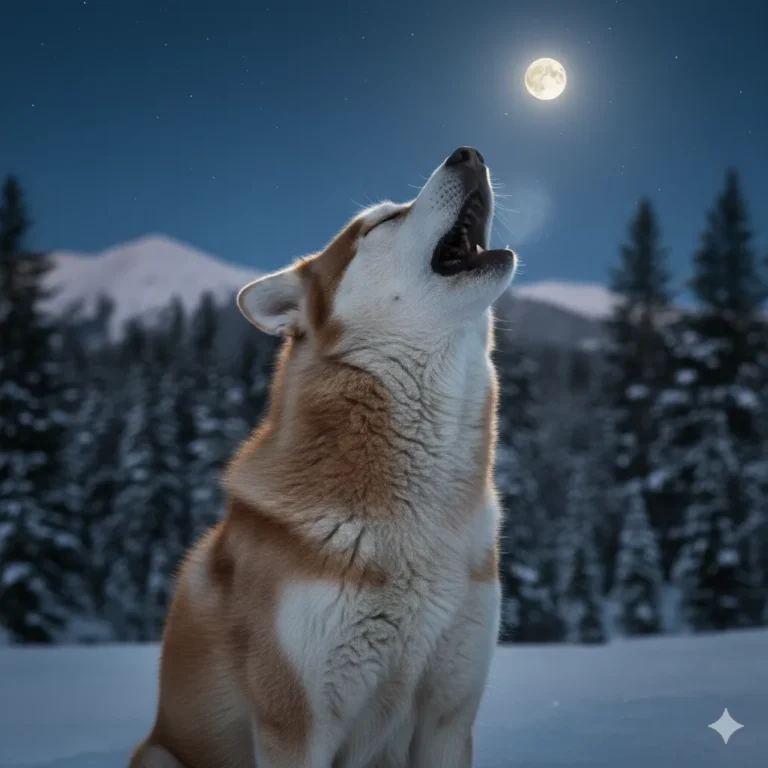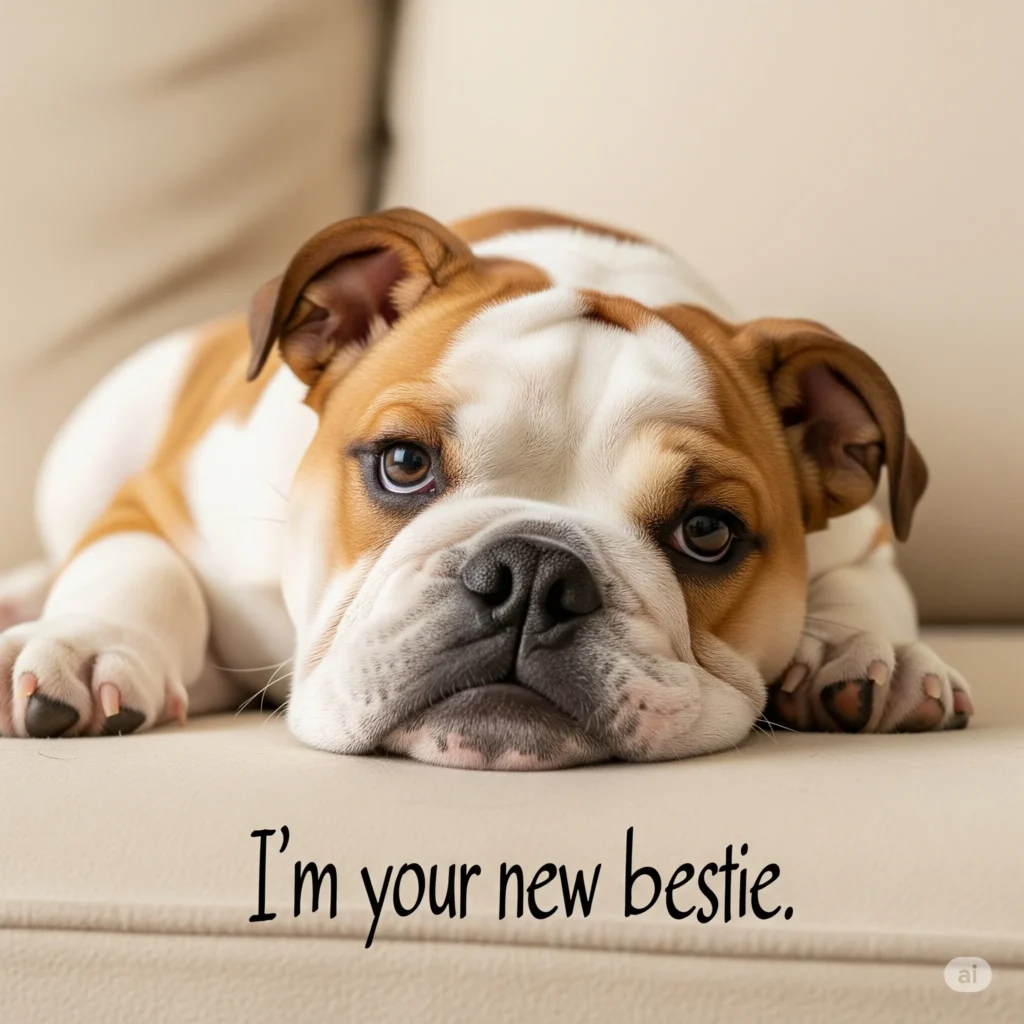
dog howling
Hey there, paw-rent! Raise your hand if you’ve ever been cozy on the couch, only to have your dog suddenly tilt their head back and let out a long, soulful “Awooooo!” that would make a wolf proud. You’re not alone! My own pup, Barnaby, a goofy Golden Retriever with a flair for the dramatic, did this just the other day when a fire truck sped by. It got me thinking—what is going on in that furry little head of his?
Is he singing along? Is he sad? Or is he just telling the neighborhood about the dream bone he buried in the backyard? As your friendly neighborhood dog expert and fellow dog-lover, I’m here to pull back the curtain on this classic canine behavior. So, grab a coffee (and maybe a treat for your furry friend), and let’s dive into the wonderful, sometimes noisy, world of dog howling together!
Why Do Dogs Howl?
Let’s rewind the clocks—way, way back. Long before they were snoozing on our memory foam dog beds, our pups’ ancestors, the wolves, used howling as their primary social media. No Wi-Fi needed! A howl could travel for miles through dense forests and over mountains to send a message. It was the ultimate “pack group chat.”
Think of it as a long-distance text message saying, “Hey, I’m over here!” or “Everyone, gather up!” Our domesticated best friends have held onto this ancient form of communication. Even though their “pack” is now us, the mailman, and that squirrel that taunts them from the fence, the instinct remains strong. It’s a deep-seated behavior that’s literally in their DNA.
As Dr. Marc Bekoff, a professor and author of Canine Confidential, puts it, “howling is a very effective way for dogs to broadcast their location and emotional state over long distances.” So, when your dog howls, they’re just tapping into their inner wolf, sending out a signal to the world (or just to you in the next room).
What Does Dog Howling Mean?
According to petMD,So, if it’s communication, what’s your pup actually trying to say? The meaning can be surprisingly nuanced, and it’s all about context. It’s like learning a new language—the language of Awoo!
- “Here I Am!” (Location and Contact): This is the classic check-in. If your dog feels separated from you or their furry siblings, a howl is their way of saying, “I’m in the backyard!” or “Where did everyone go?”
- “Listen to Me!” (Attention-Seeking): Oh, this is a big one. Has your dog ever howled right at dinner time, or when you’re on an important call? That’s no coincidence. It’s a dramatic, furry version of “Hey, human! Look at me! I require snacks and/or cuddles, stat!”
- “Intruder Alert!” (Territorial Marking): That howl at the delivery person or the dog walking past your fence is your pup’s way of saying, “This is my turf! You have been warned!” It’s a powerful, resonant “keep out” sign.
- “Join the Chorus!” (Social Bonding): You know when one dog at the dog park starts howling and suddenly it’s a full-blown canine choir? That’s all about social bonding. They’re saying, “I hear you! We’re a team!” It strengthens their sense of community.
- “Ouch!” (Pain or Distress): This is the one we need to listen for most carefully. A sudden, sharp howl can be a cry of pain. It’s their way of telling us something is wrong.
Is Howling Normal Dog Behavior?
In a word: absolutely! For the vast majority of dogs, howling is as normal as barking at the doorbell or circling before lying down. It’s a built-in part of their vocal toolkit. Some breeds are just more, well, enthusiastic about it than others. If you share your home with a Husky, Malamute, or a Beagle, you know exactly what I’m talking about—they’re the opera singers of the dog world!
So, while it might be a bit loud sometimes, it’s usually just your dog being a dog. Of course, “normal” doesn’t always mean “easy to live with,” especially in an apartment building. Understanding the why is our first step to finding harmony.
Do Dogs Howl When They’re Happy?
They sure can! While it’s less common than other reasons, a happy howl is a beautiful thing. Imagine you’ve just walked through the door after a long day. Your dog does the full-body wiggle, lets out a few excited barks, and then culminates it all with a joyful “Woo-woo!” That, my friend, is a howl of pure delight.
The key to identifying a happy howl is to look at the whole picture. Is their body wiggly and loose? Is their tail wagging like a metronome on high speed? Is their face relaxed? If yes, then that awoo is probably a celebration of your awesome presence.
Do Dogs Howl When They’re Sad?
According to webmd and VCA Animal Hospitals:
Unfortunately, yes. Our canine companions feel emotions deeply, and sadness or loneliness is a big trigger for howling. This is often tied to separation anxiety. That mournful, lonely howl you might hear (or see on your pet camera) after you leave the house is a heart-breaking cry for their pack to come back.
You can often tell a “sad howl” by its tone—it tends to sound more melancholy and drawn-out—and by the body language that goes with it: droopy eyes, a lowered head, and a general air of “my heart is breaking.”
Why Do Some Dogs Howl More Than Others?
Just like some of us are chatty and others are quiet, dogs have their own vocal personalities! Here’s why your dog might be the lead singer while your friend’s dog is a silent observer:
- Breed Predisposition: This is a huge factor. Breeds like Siberian Huskies, Alaskan Malamutes, Beagles, Basset Hounds, and other hounds were literally bred to howl. For Huskies, it was for long-range pack communication. For Beagles, it was to alert hunters they’d found prey. It’s in their blood!
- Individual Personality: Some dogs are just more vocal! It’s that simple.
- Learning and Reinforcement: If a dog discovers that howling makes you come running (even if it’s to tell them to be quiet), they’ve learned it’s an effective way to get your attention.
- Environment: Does your dog hear sirens all day? Do the neighbors have a dog that loves to sing the song of its people? A trigger-rich environment will lead to more howling.
What Triggers Dog Howling?
Let’s play detective and look at the most common culprits that get our dogs howling.
Why Do Dogs Howl at Sirens?
This is the classic scenario! That ambulance or fire truck goes by and your dog provides the backup vocals. Why?
- They Think It’s Another Dog: The most popular theory is that the high-pitched, fluctuating sound of a siren is eerily similar to another dog’s howl. Your dog’s instinct is to reply, “I hear you! I’m here too!” They’re just trying to be social.
- Territorial Warning: Some dogs perceive it as an invading sound and howl to tell it to back off from their property.
- It’s Just Plain Startling: Let’s be honest, sirens are loud and sudden. A howl can be a simple, startled reaction to a strange noise.
Why Do Dogs Howl at Certain Music?
Does your dog become a music critic every time you play a specific song? High-pitched notes from a flute, a sustained vocal, or even a specific guitar riff can trigger a howl. It’s not that they hate your taste in music (probably); it’s that those frequencies mimic the sound of another canine howling. They’re not critiquing; they’re just joining the band!
Why Do Dogs Howl When Left Alone?
According to webmd and VCA Animal Hospitals:
This is one of the most common and stressful triggers for paw-rents. If your dog howls primarily when you’re gone, it’s very often a sign of separation anxiety. Dogs are social animals, and being alone can cause genuine panic and fear for some. The howling is a distressed cry for their family to return.
This is often accompanied by other signs like pacing, destructive chewing, or accidents in the house. It’s crucial to understand this isn’t a behavioral flaw; it’s a sign of a dog in distress.
Why Do Dogs Howl at Other Dogs Howling?
This is the ultimate “call and response!” When one dog howls, it’s like they’ve started a game of telephone. Other dogs join in to:
- Acknowledge the call: “I hear you, buddy!”
- Identify their location: “I’m over here in the blue house!”
- Strengthen the pack bond: It’s a communal activity that makes them feel connected. It’s the doggy version of a group sing-along!
Why Do Dogs Howl at the Moon?
This is such a romantic image, but I’m here to (gently) bust the myth! Dogs aren’t howling at the moon itself. The more likely explanation is that dogs simply howl more at night. It’s quieter, sounds travel farther, and they’re more likely to hear distant dogs or other triggers. The moon just happens to be a silent, glowing witness to their nighttime concerts.
Should I Be Concerned About My Dog’s Howling?
For the most part, no! Occasional, context-specific howling is just your dog expressing themselves. But, as with any behavior, there’s a line where it can become a concern.
When Is Dog Howling a Sign of a Problem?
According to webmd and VCA Animal Hospitals:
It’s time to pay closer attention if the howling:
- Becomes excessive and disruptive: It’s constant, bothers your neighbors, or is making your home life stressful.
- Is a new behavior: A sudden onset of howling in a normally quiet dog is a red flag.
- Comes with other worrying signs: Look for pacing, panting, destruction, accidents, or changes in appetite.
- Seems to cause them distress: If the howling itself sounds pained or anxious.
Can Howling Indicate Pain or Illness?
According to webmd and VCA Animal Hospitals:
100%, yes. A dog in pain may howl to tell you something is wrong. This is especially true if the howling is new, sudden, or sounds more like a yelp. It could be anything from an injury to arthritis to a toothache. As Dr. Bonnie Beaver, a veterinary behaviorist, advises, “Any sudden change in a dog’s behavior, including vocalization, warrants a trip to the veterinarian to rule out medical causes.” Always, always rule out pain first.
Is Excessive Howling a Sign of Anxiety?
According to webmd and VCA Animal Hospitals:
Very often, yes. We’ve talked about separation anxiety, but other forms of anxiety can also cause howling.
- Generalized Anxiety: A generally nervous dog might howl at thunderstorms, fireworks, or unfamiliar situations.
- Frustration: A dog who can see another dog but can’t get to them might howl out of frustration.
Anxiety howling is usually part of a bigger picture of stress signals.
How Can I Manage or Stop My Dog’s Howling?
According to webmd and VCA Animal Hospitals:
Okay, so the howling has crossed from cute to concerning. Don’t worry! We can work on this. The golden rule is: Identify the cause first. You can’t fix the behavior until you know the motivation behind it.
How Do You Train a Dog to Stop Howling?
According to webmd and VCA Animal Hospitals:
For attention-seeking howling, training is your best friend (besides your dog, of course!).
- Don’t Reward the Howl: This is tough, but you have to become a statue when they howl for attention. No eye contact, no talking, no touching. Any reaction is a reward.
- Reward the Quiet: The instant they stop howling, even to take a breath, you spring into action! Praise them calmly and give a treat. They learn: quiet = good things.
- Teach the “Quiet” Command:
- Let them howl once or twice (maybe ring the doorbell to trigger it).
- Hold a super tasty treat to their nose. The smell will make them stop to sniff.
- The moment they are silent, say “Quiet!” in a calm voice and give them the treat.
- Practice this, slowly asking for longer periods of silence before the reward.
What Are Effective Ways to Reduce Separation Anxiety Howling?
This requires patience and a gentle approach, as it’s rooted in fear.
- Make Departures Boring: No long, emotional goodbyes. Just grab your keys and go. Same for returns—ignore them for a few minutes until they’re calm.
- Create a Positive Alone-Time Association: Give them an amazing, special treat only when you leave. A KONG stuffed with peanut butter and frozen is a classic for a reason—it keeps them busy and happy.
- Tire Them Out: A good walk or play session before you leave can work wonders. A tired dog is a calm dog.
- Seek Professional Help: For severe separation anxiety, please consult a certified professional dog trainer or a veterinary behaviorist. It’s a complex issue, and they can provide a tailored plan that might include behavior modification and, in some cases, medication.
Are There Specific Commands to Stop Howling?
According to webmd and VCA Animal Hospitals:
The “Quiet” command we practiced above is your go-to! It directly teaches your dog that silence is what you want. Consistency is everything with this one.
When Should I Seek Professional Help for My Dog’s Howling?
According to webmd and VCA Animal Hospitals:
Don’t hesitate to call in the pros if:
- You’ve ruled out medical issues with your vet, but the howling continues.
- You suspect it’s linked to serious anxiety.
- Your own training efforts haven’t made a difference after a few weeks.
- You’re feeling stressed and overwhelmed.
Look for a Certified Professional Dog Trainer (CPDT-KA) or a Veterinary Behaviorist (DACVB). They are the experts who can help you and your pup find peace.
Understanding Different Howling Contexts:
Why Do Puppies Howl?
Puppies are like tiny, furry babies, and their howls often mean the same thing: “I need something!” It’s usually:
- Loneliness: Those first few nights away from their littermates are tough. A soft, comforting toy and a warm bed can help.
- Basic Needs: Hunger, thirst, or needing to potty.
Be patient and consistent, and they’ll usually grow out of the constant nighttime serenades.
Do Different Breeds Howl Differently?
Oh, definitely! It’s part of what makes breeds so unique.
- Huskies & Malamutes: The dramatic, talking, “woo-woo” howlers. They’re known for their wide range of vocalizations.
- Beagles & Hounds: The owners of the deep, baying howl. It’s a hunting cry designed to be heard from far away.
- Other Breeds: Many can and do howl, but it might sound more like a bark-howl mix. It’s all part of their unique charm!
How Does a Dog’s Environment Affect Its Howling?
Massively! A dog’s surroundings are a huge factor.
- Boredom: A dog with nothing to do is a dog who might howl for entertainment. Puzzle toys and regular exercise are key!
- Isolation: A dog left alone in the yard for hours is likely to howl out of loneliness.
- Noise Triggers: Living in a busy area with lots of sirens and other dogs will naturally lead to more howling.
Understanding your dog’s howl is like getting a direct line into their thoughts and feelings. It’s a behavior steeped in history, emotion, and instinct. By listening with patience and curiosity, we can strengthen our bond with them and make sure all their “awoos” are happy, healthy ones.
please leave comment
you may like it






